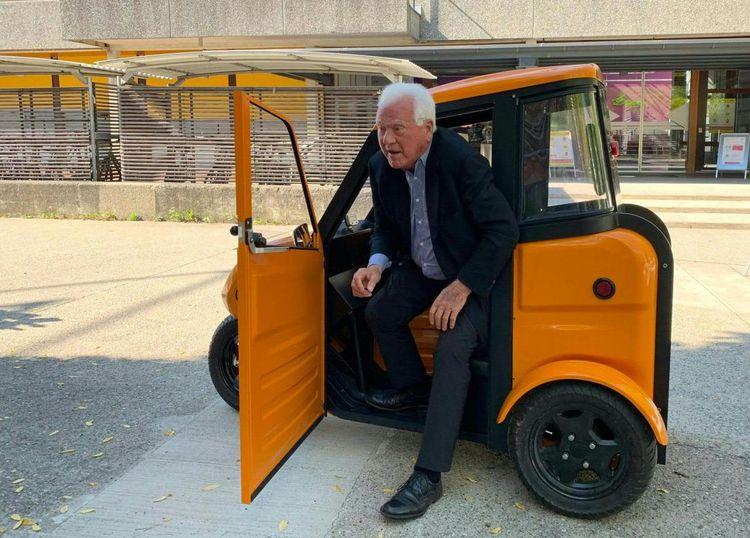The now 89-year-old Austro-Canadian entrepreneur and Magna founder Frank Stronach has a new project at the start: The Sarit, a one-seater, three-wheeled micro-electric vehicle with which he can have a say in changing mobility want.
The idea came to him a few years ago while standing in a traffic jam on the way to Toronto: "That's a waste of energy and in 95 percent of the cars there was only the driver. That can't be." It was the reason to work on a model from the field of "micro-mobility", said Stronach, who is convinced that the small vehicles have a great future: "Whether we want it or not."
For the design of the Sarit, he dealt a lot with the topic of greenhouse gases and environmental impacts: "It's serious," warned Stronach and criticized that conventional cars take up too much parking space. In an interview with the Canadian Financial Post, the elderly entrepreneur therefore described the sari as his "masterpiece", his "crowning glory".
European headquarters in Styria
In a first plant north of Toronto, Canada, production is scheduled to start in the second quarter of 2022. Stronach wants to have 120,000 vehicles produced there every year. The first Sarit models should also be available in Austria at the end of 2022. "The main purpose is getting from home to work and back," Stronach explained.
The European headquarters, including a research center and factory, are to be built in Laßnitzthal near Gleisdorf in Styria. Plans for construction could become more concrete in 2022. In any case, Stronach already has the property: more than a decade ago he acquired an area of around 13 hectares there.
A bet on micro-mobility
It remains to be seen whether the idea will actually be accepted. Stronach is neither the first nor the only one who had the idea for a micro car. Although he's convinced that's the case. "I want to be first out of the gate with the small car," he explained in an interview with the Financial Post.

However, similar tiny vehicles that do not require a driver's license have been available for road traffic from various manufacturers for a long time. And a modern version of the one-seater e-road car has been available from Renault with the Twizy since 2011. Of course, the Renault Twizy has not been a big seller so far. The annual global production, originally set at 9,000 units, was soon reduced to 2,500 units. In 2019, production was relocated to Korea, which led to a prolonged production stop and since then, hardly any more vehicles have been delivered.
Compared to the Twizy, which certainly has an interesting look and a confidence-inspiring design with modern safety features, Stronach's Sarit looks like an ugly duckling, a three-wheeled, too hot-washed 2CV, built in the mid-1980s.
However, Stronach has a very interesting price promise compared to other manufacturers. The Sarit should be available from a starting price of around 4,000 euros as a single-seater with a range of around 80 kilometers. The cheapest version of the Twizy costs around three times as much (€11,450), while the cheapest "Club" model from microcar manufacturer Ligier is currently on the price list at €13,490.
The Sarit can be charged at any socket and is deliberately no wider than 1.10 meters and no longer than 2.30 meters, since space and parking spaces are scarce in cities. Four of Stronach's e-mobiles should fit in a normal car parking space, two of these micro-vehicles have space next to each other in one lane.
Stronach therefore sees micro-cars as a crucial part of the urban mobility mix of the future. However, the vehicles are not designed for expressways or motorways.
Political welcome message
For the Styrian provincial governor Hermann Schützenhöfer, it is certainly an interesting story when Stronach wants to breathe new life into the somewhat ailing automotive cluster in the federal state. The exhaust specialist Remus recently announced that it would be closing its main plant in Bärnbach. "The automotive industry is in a state of upheaval," explained Schützenhofer and thanked Stronach for the planned investment.
The entrepreneur, who was born Franz Strohsack in the Weiz district, has brought thousands of jobs to Styria with Magna: "Now he's taking off again with the car," says Schützenhöfer, who squeezed himself into one of the Sarit prototypes and took a test drive on the premises of the TU Graz. "It plays all parts, is affordable and has low operating costs," he summarized afterwards.
The governor predicted at least 500 new jobs to be created by the plant in Laßnitzthal. Vice Governor Anton Lang said that the sari "will be an integral part of the street scene in a few years". Economics Minister Barbara Eibinger-Miedl added: "Stronach thinks and relies on Styria."
According to Stronch, there were no talks with Magna about the construction of the small electric vehicle. The vehicle is to be built by the newly founded Stronach International. So far, Frank Stronach is its only shareholder, 40 percent of the profits are to go to his grandchildren, 20 percent are to be given to managers and workers, 10 percent are planned as social donations and 30 percent are to be reinvested.



